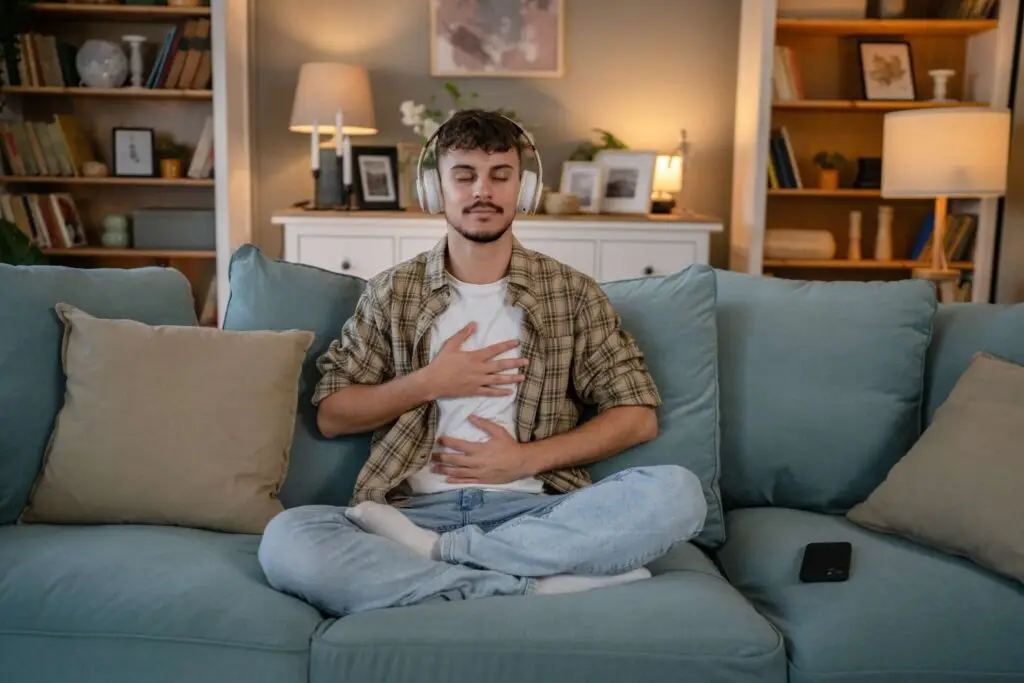Core Therapy
Mindfulness-Based Cognitive Therapy (MBCT)
Mindfulness-Based Cognitive Therapy, or MBCT, blends mindfulness practice with the practical tools of cognitive behavioral therapy. It teaches you how to notice unhelpful thought patterns the moment they start and respond with calm, clear actions. Unlike talk therapy that focuses mainly on past events, MBCT is very here-and-now, with simple exercises you can use during stress, cravings, anxiety, or low mood.
Major Health Organizations recommend MBCT



Understanding MBCT
MBCT helps you change your relationship with thoughts and feelings. You learn brief mindfulness practices, then pair them with CBT strategies like reframing and problem-solving. Sessions include education, guided practice, and real-life home exercises. Many people find it easier to stick with because the tools are concrete and the wins are visible, like sleeping through the night again or getting through a tough meeting without spiraling.
You practice short, repeatable routines. You track what works in a simple way. You see relief build week by week.
You learn how to calm your body, steady your attention, and challenge thought traps. You practice in and between sessions. You leave with a plan you can follow.
You’ll know what to do when stress hits. You’ll have scripts, checklists, and a few “go-to” practices. You’ll feel more in control of your day.




How MBCT Works
MBCT is a step-by-step program that pairs short mindfulness drills with practical CBT tools you can use the same day. It’s designed to fit real life, not the other way around.
Start with your goals
You begin by naming what would actually make life easier. Maybe it’s fewer panic spikes at work, less Sunday dread, or falling asleep without a fight. Your therapist helps turn those into clear targets so every session has a purpose you can feel.
Learn the basics of mindfulness
You practice simple moves like a one-minute breath at the kitchen sink or a short body scan before bed. The goal isn’t perfect calm; it’s learning to notice what’s happening inside you without getting swept away. Many people start by pairing a breath with daily routines—handwashing, red lights, or logging into a meeting—so practice happens without extra effort.
Spot and label thought loops
When your boss sends a short email, your brain might jump to “I’m in trouble.” In MBCT, you learn to label that as mind-reading or all-or-nothing thinking. Once it has a name, it has less power. You can check the facts, take a steady breath, and respond instead of react.
Use the 3-Minute breathing Space
This is your in-the-moment reset. Picture 5 p.m. when cravings or stress spike. For three minutes, you notice what’s here, follow a few slow breaths, and choose the next small step that keeps you on track—pour a sparkling water, text a support person, step outside for fresh air. It’s quick, portable, and works anywhere.
Practice real-life swaps
Between sessions, you test tiny changes in the spots that trip you up. If doomscrolling keeps you up, you swap it for a warm shower and a five-minute body scan. If mornings are rough, you try a two-minute grounding routine before checking messages. For tough conversations, you keep a pocket script with two lines you can say when emotions run high.
Review, adjust, and plan ahead
Each week you look at what helped and what didn’t. You track simple wins like “fell asleep in 20 minutes” or “rode out an urge.” Together you tweak the plan, add backup options for hard days, and build “if-then” playbooks—if a trigger pops up, then here’s the calm next step. Over time, the tools become second nature and the setbacks get shorter and less intense.
Our MBCT Experts
MBCT at The Haven Detox is led by licensed therapists with advanced training in CBT and mindfulness-based care. They understand addiction, anxiety, mood disorders, and trauma, and they integrate MBCT with the rest of your treatment plan so you get one clear path forward. Sessions are structured but warm, and every practice is tailored to what you’re working through today.

Executive Director
- Helps clients build mindfulness skills to manage stress and improve emotional balance.

Therapist
- Guides individuals in applying MBCT strategies to cope with anxiety and mood challenges.

Primary Therapist
- Supports clients in integrating MBCT practices into daily life for lasting recovery.
What MBCT Can Support
MBCT helps with real life, not just ideas. Here’s what that looks like day to day.
Substance use recovery
Five o’clock hits and cravings show up. MBCT gives you a pause-and-pivot routine. You ride the urge like a wave—notice it rise, peak, and fade—while you delay for fifteen minutes, sip something cold, and step outside for fresh air. You check your “why” card in your wallet and, if needed, make a two-minute call to a support person before you decide the next move.
Insomnia and restless nights
It’s 3 a.m. and your brain is loud. Instead of wrestling the clock, you run a gentle body scan, let thoughts pass like cars on a road, and write any “must-remember” items on a bedside note. If you’re still awake after a bit, you move to a chair with dim light and breathe until you feel drowsy again. No judgment, just steady steps that teach your nervous system it can settle.
Depression and relapse prevention
Think of that Sunday afternoon slide when everything feels heavy. With MBCT, you learn to spot early warning signs—less energy, more isolation, harsher self-talk—and respond fast. A three-minute breathing space, a quick text to a friend, a shower, and a 10-minute walk can be your “first aid kit” that stops a deeper dip before it starts.
Anxiety and constant worry
Picture the hours before a presentation when your mind is racing. Instead of wrestling with “what if I mess up,” you label the thought (“fortune-telling”), take a slow breath, and anchor to what’s in front of you—feet on the floor, air moving in and out, notes in your hand. You use a one-minute script: notice the worry, breathe, then choose the next small step, like opening the slide deck and reading the first line out loud.
Trauma-related triggers
A sound or smell catches you off guard, and your chest tightens. Instead of getting swept away, you ground: name five things you can see, four you can feel, three you can hear. You relax your jaw, press your feet into the floor, and give yourself a simple cue—“I’m safe right now.” You can also plan an exit or set a boundary without shame, because safety comes first.
Stress, burnout, and irritability
On busy days, stress leaks out as snappy replies or shutdowns. MBCT builds short resets into the day—ninety-second breath breaks after meetings, a mindful stretch before emails, a two-minute “arrive home” ritual in the car. You end the day less fried, with enough fuel left to be present with the people you care about.
Beyond the Session
Care does not stop when the hour ends. Many clients pair MBCT with individual therapy, medical care, and peer support. Family check-ins and education can be added so the people who care about you know how to support your new routines. When treatment steps down, you leave with a practical maintenance plan and options for virtual follow-ups to keep the momentum going.
Learn Emotional Balance
Calm, Safe Place to Relax
Share Experiences
Locations Offering MBCT
MBCT is available at select The Haven Detox centers in peaceful, private settings designed for focus and comfort. In-person and telehealth options are offered where allowed. Call to confirm availability at the location nearest to you.

The Haven Detox - Arizona
Space Available
Insurance Accepted
MBCT offered

The Haven Detox - New Jersey
Space Available
Insurance Accepted
MBCT offered

The Haven Detox - Little Rock
Space Available
Insurance Accepted

The Haven Detox - Puerto Rico
Space Available
Insurance Accepted
MBCT offered

The Haven Detox - Florida
Space Available
Insurance Accepted

The Haven Detox - West Memphis
Space Available
Insurance Accepted

The Haven Detox - New England
Space Available
Insurance Accepted
MBCT Success Stories
Alex J.
MixedNuts
Before I knew what [MBCT] was, I went through two therapists and hardly made any progress… At first, I thought MBCT and the meditative practices were bullshit, but three and a half weeks in I began to see changes. Now I’m much calmer, more confident, and focused on my goals—I survived the holidays without panic attacks or anger, and I’m even building a better relationship with my mom.
Shane T.
Insurance Coverage & Accessibility
Most insurance plans cover MBCT when delivered by qualified clinicians as part of an outpatient, residential, or intensive program. The Haven Detox offers a fast, confidential benefits check before you start and can discuss self-pay options if needed. Scheduling is flexible, with daytime and evening times available at most locations.
FAQs About MBCT
What exactly is MBCT?
MBCT combines mindfulness practices with cognitive behavioral tools. You learn to notice unhelpful thoughts early and respond with calm, practical steps.
Does MBCT really work? What does the research show?
Yes. Strong evidence shows MBCT helps prevent depression from returning. A large analysis of nine randomized trials found people who completed MBCT were less likely to relapse over the following year than those receiving usual care, with results similar to maintenance antidepressant treatment. Read the study.
How is MBCT different from regular CBT or MBSR?
CBT focuses on changing thoughts and behaviors. Mindfulness-Based Stress Reduction (MBSR) focuses on present-moment awareness. MBCT blends both so you can spot thought traps and steady your nervous system at the same time.
How long does it take to see results?
Many people notice small improvements in two to three weeks, like fewer spikes of anxiety or better sleep. Skills build over eight to twelve sessions and keep growing with practice.
What happens in a typical session?
You’ll check in, learn or refine a skill, practice it with guidance, and make a simple plan to use it in daily life. You leave with clear next steps, not homework that overwhelms you.
Do I have to sit still or meditate for long periods?
No. Practices are short and practical. If sitting is hard, you can try mindful movement, standing practices, or eyes-open exercises.
Can MBCT work alongside medication or other therapies?
Yes. MBCT often enhances the benefits of medication, medical care, and other therapies like DBT or trauma-focused treatment. Your team coordinates so nothing conflicts.
Is MBCT helpful for addiction recovery?
Very. It builds the pause between urge and action, reduces shame spirals after slips, and strengthens the routines that make recovery stick.
Is this offered in groups or one-to-one?
Both options exist at many locations. Group work adds support and practice partners. Individual sessions allow deeper personalization.
What if I miss a week or fall behind?
You can rejoin and review. MBCT is built to meet you where you are, not punish you for life happening.
How will we measure progress?
You’ll set goals at the start, then track stress, sleep, mood, or cravings using simple check-ins. You and your therapist adjust the plan as you improve.
Have Questions? Let’s Talk!
Call the free 24/7 helpline to get answers and a plan for treatment that’s best for your specific medical and insurance situation — even if it’s not with us.
24/7 Support
Need someone to talk to? We’re always here—day or night.
No Commitment
Ask questions, get guidance—no pressure, no obligation.
100% Private
Your story stays with us. Confidential support, always.

